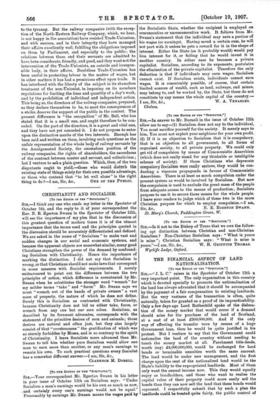[To TRH EDITOR OP TRH "SPECTATOR:1 SIR, — Your correspondent Mr. Egerton
Swann in his letter in your issue of October 12th on Socialism says: "Under Socialism a man's earnings would be his own as much as now, awl certainly every one's earnings would not be equal." Presumably by earnings Mr. Swann means the wages paid by the Socialistic State, whether the recipient is employed on remunerative or unremunerative work. It follows from Mr. Swami's statement that the individual may save a portion of his wages (or earnings). Having saved a certain sum, he will not part with it unless be gets a reward for it in the shape of interest. Either the State (as it probably would) would pay him interest for it, or failing that he would invest it in another country. In either ease he becomes a private capitalist. Socialism, according to its exponents, postulates the elimination of the private capitalist. Therefore the only deduction is that if individuals may earn wages, Socialism cannot exist. If Socialism exists, individuals cannot earn wages. It is conceivably possible, of course, that certain limited sources of wealth, such as land, railways, and mines, may belong to, and be worked by, the State, but these do not constitute by any means the whole capital of the country.—










































 Previous page
Previous page